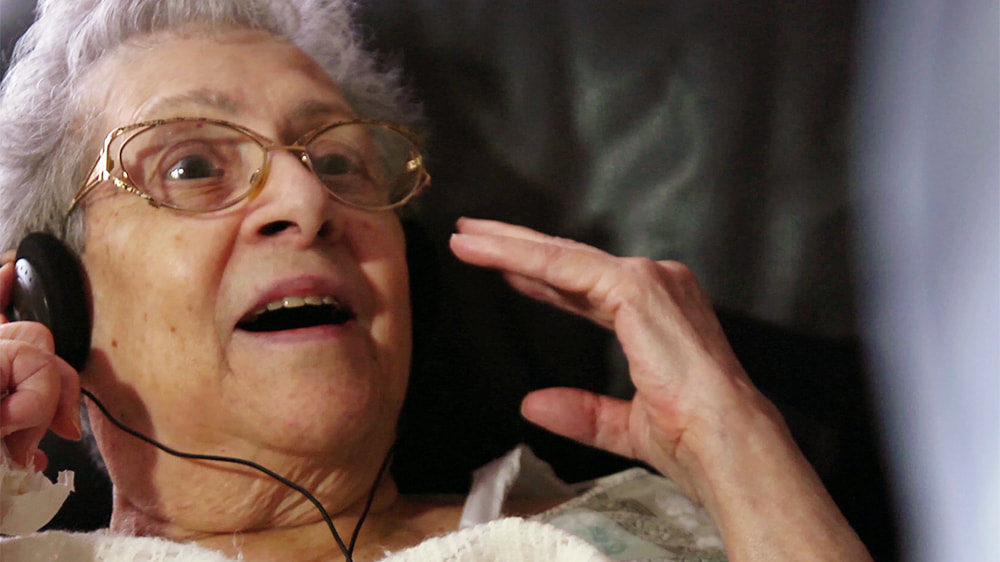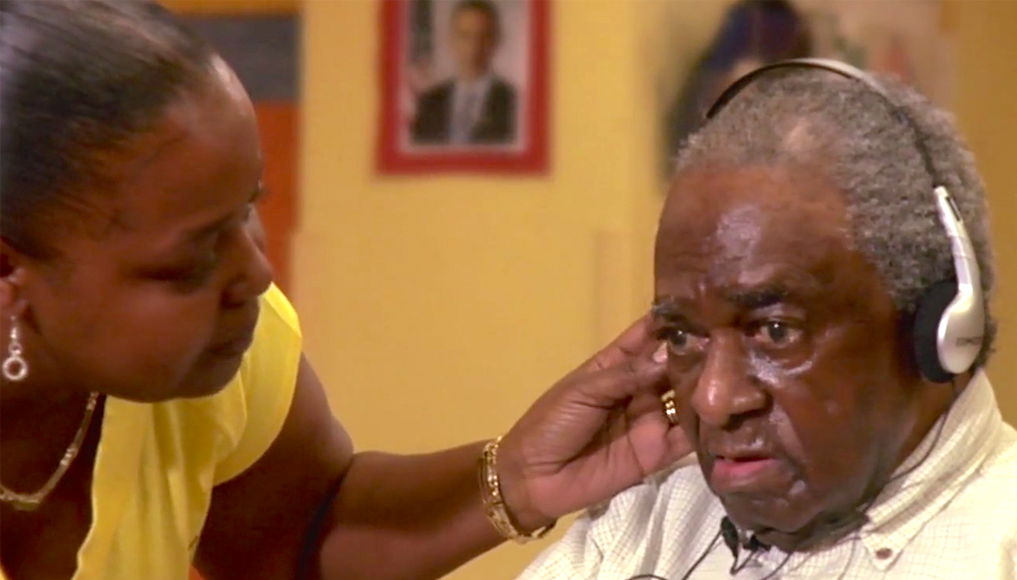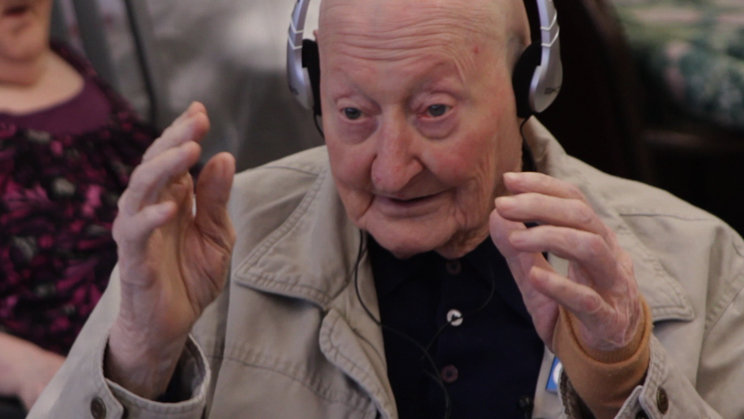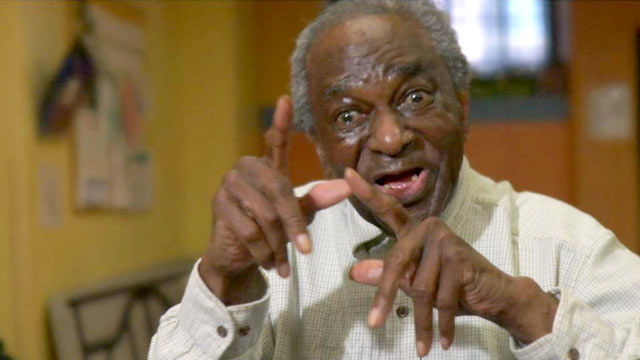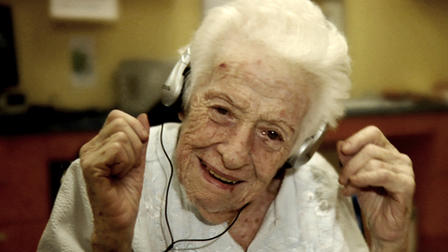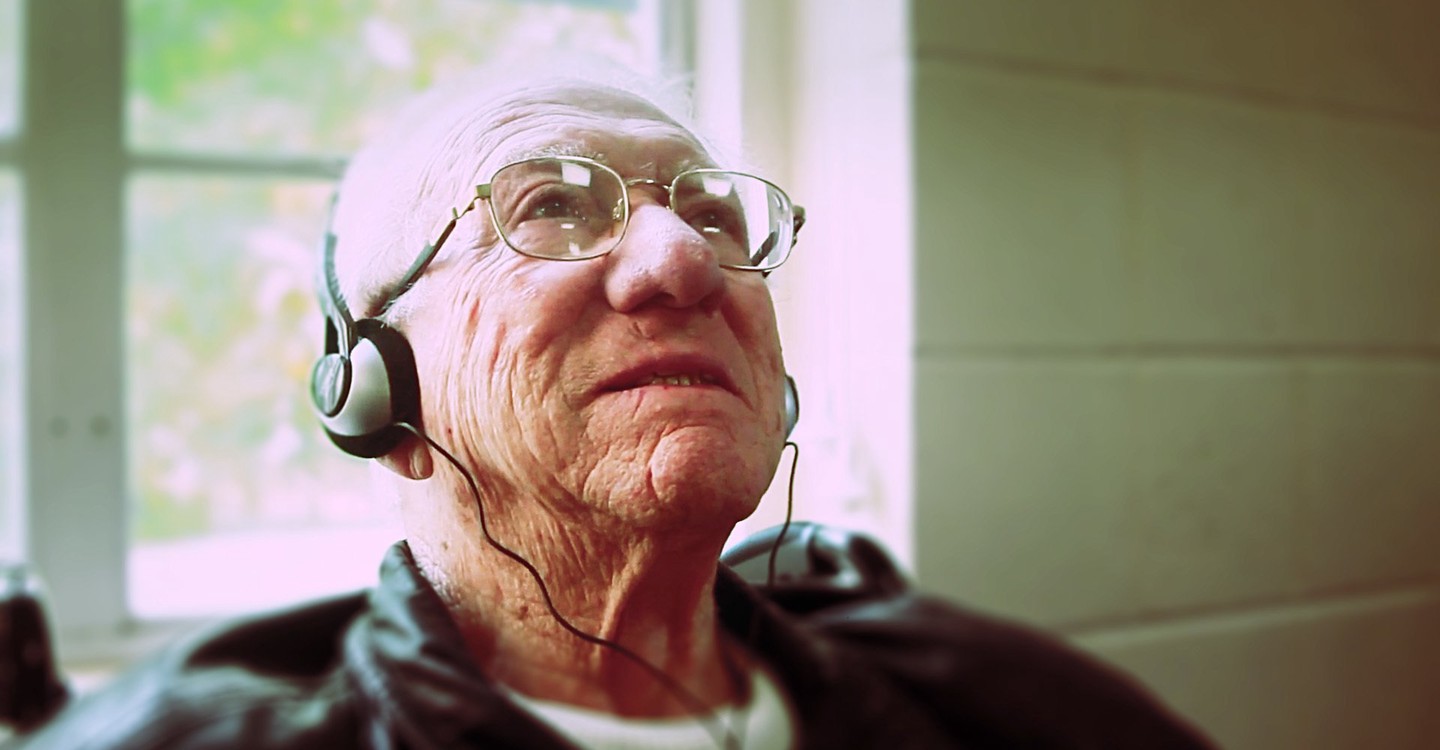images from Music and Memory website, which is supplying the headphones
and training church members: https://musicandmemory.org/
Music and Spirit Ministry
for Older Adults
with cognitive and physical challenges
From First United Methodist Church in Conway, Arkansas
"A group in our congregation has been working towards starting a new ministry, which we are calling “Music and the Spirit.” Led by Jay McDaniel and Janet Gingerich, FUMC’s director of Music and Worship ministries, this new ministry is designed to provide personalized music playlists for older adults with cognitive and physical challenges, with an emphasis on those with dementia. Studies have shown that music can tap deep memories not lost to dementia and can bring participants back to life, enabling them to feel like themselves again -- to converse, socialize and stay present.
The “Music and the Spirit” playlists are made in consultation with the input of the patient and/or family members, or, if that is impossible, based on knowledge of the music popular at notable times during the patient’s lifetime. A playlist would typically cover a wide range of musical genres -- popular, jazz, hymns and other sacred pieces, and classical, according to the individual’s preferences. Funded by a grant from the Taylor Foundation, our pilot program has been set up with Stonebridge Senior Living. “We have been in conversation this Spring with Stonebridge, but long -term we will work with contacts we have through our own congregation, as well as collaborate with other care facilities in Conway,” said Janet.
This initiative has a place for volunteers with a wide range of skills and interests. Some may be interested at the personal level, being involved with patients and family members as music is selected, developing a relationship with the patient, visiting and listening to the music together. Others may have technical skills which could be used to do the work of actually making the playlists; still others may be good administrators and would like to be involved on the organizational side. “So many of us have, or have had, firsthand knowledge of the challenges faced by dementia patients and their families. We hope you will see a way YOU can participate, on any level,”
The “Music and the Spirit” playlists are made in consultation with the input of the patient and/or family members, or, if that is impossible, based on knowledge of the music popular at notable times during the patient’s lifetime. A playlist would typically cover a wide range of musical genres -- popular, jazz, hymns and other sacred pieces, and classical, according to the individual’s preferences. Funded by a grant from the Taylor Foundation, our pilot program has been set up with Stonebridge Senior Living. “We have been in conversation this Spring with Stonebridge, but long -term we will work with contacts we have through our own congregation, as well as collaborate with other care facilities in Conway,” said Janet.
This initiative has a place for volunteers with a wide range of skills and interests. Some may be interested at the personal level, being involved with patients and family members as music is selected, developing a relationship with the patient, visiting and listening to the music together. Others may have technical skills which could be used to do the work of actually making the playlists; still others may be good administrators and would like to be involved on the organizational side. “So many of us have, or have had, firsthand knowledge of the challenges faced by dementia patients and their families. We hope you will see a way YOU can participate, on any level,”
We can love our loved ones for the selves they are, not the selves they were.
It is these selves -- the selves they are -- that God lovingly redeems, moment by moment.
Music mininistries for older adults with cognitive and physical challenges
is one way of participating in their redemption and being redeemed ourselves.
They experience grace through moments of aliveness, and we do, too. The moments,
ore occasions when the love of God is known on earth as it is in heaven.
Moments of Aliveness
to quicken: to come to life, to shine more brightly, even if only for a moment
One way that we care for others with Alzheimer's and dementia -- one way that we can practice the presence of the God -- is to make music with them and to provide them with opportunities to enjoy music, live and recorded,
The music functions as a way that they experience God, directly, in the music itself and in the momentary joy it brings. They are, in the words of Oliver Sacks, "quickened."
This quickening, this aliveness, is enjoyable in its own right; it is what Frederic and Mary Ann Brussat call "zeal" or zest for life. It may be accompanied by an awakening of memories that give her a sense of being a person with a history. It may result in an improvement of her linguistic or motor skills and in her relations with those around her. It may even reduce her need for anti-psychotic medications. These results are all to the good.
But the moment of aliveness in itself is a good, even apart from these additional results. It is a moment when she experiences a taste of heaven on earth and when, in fact, her earthly life partakes of deep joy in whom the universe lives and moves and has its being, and whose name is love. She experiences, in that moment, God with a Spacious Heart. The moment of aliveness is a building block of God's life, too.
-- Jay McDaniel
One way that we care for others with Alzheimer's and dementia -- one way that we can practice the presence of the God -- is to make music with them and to provide them with opportunities to enjoy music, live and recorded,
The music functions as a way that they experience God, directly, in the music itself and in the momentary joy it brings. They are, in the words of Oliver Sacks, "quickened."
This quickening, this aliveness, is enjoyable in its own right; it is what Frederic and Mary Ann Brussat call "zeal" or zest for life. It may be accompanied by an awakening of memories that give her a sense of being a person with a history. It may result in an improvement of her linguistic or motor skills and in her relations with those around her. It may even reduce her need for anti-psychotic medications. These results are all to the good.
But the moment of aliveness in itself is a good, even apart from these additional results. It is a moment when she experiences a taste of heaven on earth and when, in fact, her earthly life partakes of deep joy in whom the universe lives and moves and has its being, and whose name is love. She experiences, in that moment, God with a Spacious Heart. The moment of aliveness is a building block of God's life, too.
-- Jay McDaniel
